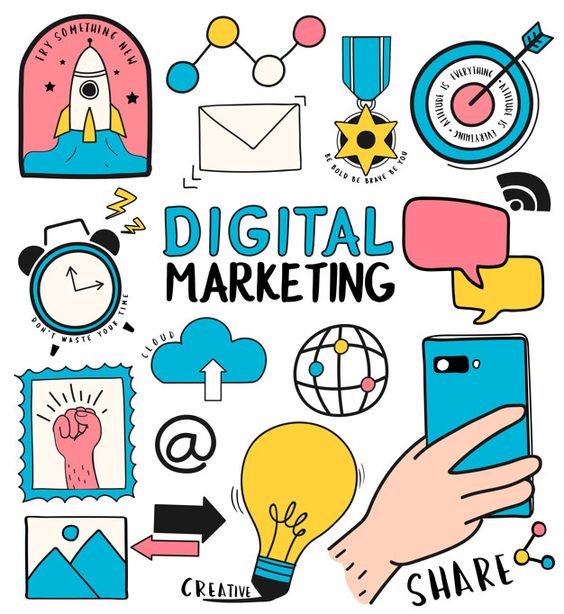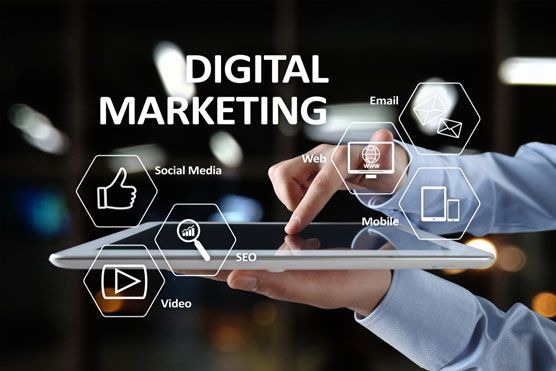In today’s digital age, marketing has evolved beyond traditional methods, making digital marketing skills highly valuable.
A Diploma in Digital Marketing is an excellent way to gain the expertise needed to thrive in this dynamic field. This guide will break down what a diploma in digital marketing entails, its benefits, and what you can expect from such a program.
What is a Diploma in Digital Marketing?
A Diploma in Digital Marketing is a specialized educational program designed to equip students with the essential skills and knowledge required to execute effective digital marketing strategies. These programs typically cover a wide range of topics, including social media marketing, search engine optimization (SEO), content marketing, email marketing, and data analytics.

Why Pursue a Diploma in Digital Marketing?
- High Demand for Skills: Businesses of all sizes are looking to enhance their online presence. A diploma in digital marketing provides the skills necessary to meet this demand.
- Career Opportunities: With this qualification, you can pursue various roles such as digital marketing specialist, social media manager, SEO expert, or content marketer.
- Flexibility: Digital marketing skills are versatile and can be applied across different industries, giving you flexibility in your career.
- Up-to-Date Knowledge: The digital landscape is constantly evolving. A diploma program ensures you stay current with the latest trends and technologies.
Core Components of a Digital Marketing Diploma Program
- Social Media Marketing: Learn how to leverage platforms like Facebook, Instagram, Twitter, and LinkedIn to engage with your audience and promote products or services.
- Search Engine Optimization (SEO): Understand the techniques to optimize websites so they rank higher in search engine results, driving organic traffic.
- Content Marketing: Discover the power of creating valuable, relevant content to attract and retain a clearly defined audience.
- Email Marketing: Master the art of crafting compelling emails that convert readers into customers.
- Data Analytics: Gain insights into how to analyze data to measure the success of marketing campaigns and make informed decisions.
- Pay-Per-Click (PPC) Advertising: Learn about paid advertising strategies, including Google Ads, to drive targeted traffic to websites.
- Digital Strategy and Planning: Understand how to develop comprehensive digital marketing strategies that align with business goals.
What to Expect from a Digital Marketing Diploma Program
- Duration: Most programs range from a few months to a year, depending on whether you study part-time or full-time.
- Mode of Study: Many institutions offer flexible learning options, including online, in-person, or hybrid models.
- Assessment: Expect a combination of practical assignments, projects, and exams to assess your understanding and application of digital marketing concepts.
- Industry Insights: Programs often include guest lectures from industry professionals and case studies to provide real-world insights.
- Certifications: Upon completion, you’ll receive a diploma that can significantly boost your resume. Some programs may also prepare you for additional certifications like Google Analytics or HubSpot Content Marketing.
How to Choose the Right Program
- Accreditation: Ensure the program is accredited by a recognized educational institution or industry body.
- Curriculum: Look for a comprehensive curriculum that covers all essential aspects of digital marketing.
- Faculty: Check the credentials and experience of the instructors.
- Reviews and Testimonials: Research what past students have to say about the program.
- Support Services: Consider programs that offer career services, such as job placement assistance and networking opportunities.
Diploma in Digital Marketing After 10th Grade: A Pathway to Success
Choosing a career path after completing the 10th grade can be a significant decision. For those interested in the dynamic world of digital marketing, pursuing a Diploma in Digital Marketing can be a rewarding choice. Let’s explore what this entails and how it can pave the way for a successful career.

Benefits of Pursuing a Diploma in Digital Marketing After 10th Grade:
- Early Entry into the Field: Starting your digital marketing journey early allows you to gain industry experience and establish yourself sooner.
- Hands-On Learning: Diploma programs often include practical training, workshops, and projects, providing valuable hands-on experience.
- Career Opportunities: Upon completion, you can explore roles such as digital marketing assistant, social media coordinator, or content creator.
- Industry-Relevant Skills: Learn about the latest digital marketing trends, tools, and strategies that are in demand in the job market.
- Entrepreneurial Skills: Acquire skills that are beneficial if you plan to start your own digital marketing agency or freelance business in the future.
How to Pursue a Diploma in Digital Marketing After 10th Grade:
- Choose a Reputable Institution: Look for institutions or training centers that offer recognized diploma programs in digital marketing.
- Check Eligibility Criteria: Ensure you meet the eligibility requirements, which may include a minimum age limit and educational qualifications.
- Course Duration: Diploma programs typically range from 6 months to 1 year, depending on the institution and course structure.
- Curriculum: Review the curriculum to ensure it covers essential digital marketing topics and includes practical training components.
- Internship Opportunities: Opt for programs that offer internship opportunities as they provide valuable real-world experience.
- Certifications: Some programs may also prepare you for industry certifications such as Google Analytics or Facebook Blueprint.
Specializations and Electives:
- Advanced Topics: Some diploma programs offer specialized electives in areas like advanced SEO, e-commerce marketing, social media advertising, or digital analytics. Consider these options based on your interests and career goals.
- Portfolio Building: Look for courses that include projects or assignments where you can create a portfolio showcasing your skills. A strong portfolio can be a valuable asset when applying for jobs or internships.
- Industry Connections: Choose programs that have strong industry connections, guest lectures, or networking opportunities. Building relationships with professionals in the field can open doors to internships or job placements.

Career Progression:
- Further Education: After completing a Diploma in Digital Marketing, you may consider pursuing higher education such as a bachelor’s degree or specialized certifications to deepen your knowledge and advance your career.
- Job Roles: Explore various job roles in digital marketing, such as digital marketing executive, SEO specialist, social media manager, content strategist, or digital marketing analyst. Identify your areas of interest and skills to tailor your career path.
- Freelancing or Entrepreneurship: With a strong foundation in digital marketing, you can explore freelancing opportunities, work as a consultant, or even start your own digital marketing agency. Entrepreneurial skills learned during the diploma can be valuable in these endeavors.
Practical Experience and Projects:
- Internships: Seek internships during or after completing your diploma to gain practical experience and apply your knowledge in real-world scenarios. Internships also help you build professional networks and enhance your resume.
- Live Campaigns: Some programs may offer opportunities to work on live digital marketing campaigns for real clients or businesses. Participating in such projects can provide valuable insights and boost your confidence.
- Continuous Learning: Digital marketing is a fast-paced field with constant updates and innovations. Stay updated with industry trends, attend workshops or webinars, and consider joining professional associations or communities to continue learning and growing in your career and industry exposure, you can carve a path towards exciting job opportunities, entrepreneurship, or further academic pursuits. Stay curious, stay motivated, and embrace the evolving landscape of digital marketing to thrive in this dynamic field.
Understanding Diploma in Digital Marketing Course Fees
Digital marketing has become an essential skill in today’s business landscape, driving demand for professionals well-versed in online strategies. Pursuing a Diploma in Digital Marketing in India can open doors to exciting career opportunities. However, one of the first questions that often comes to mind is about the course fees. Let’s break down the typical costs associated with these programs.
Factors Affecting Course Fees:
Institute Reputation: The reputation and ranking of the institute offering the diploma can significantly impact the course fees. Institutes with a strong reputation in the industry often have higher fees because they are known for providing top-notch education and carry a prestigious brand image.
- Course Duration: The duration of the diploma program varies across institutes, ranging from a few months to a year or more. Longer-duration courses may have higher fees compared to shorter ones.
- Curriculum and Resources: The comprehensiveness of the curriculum, access to industry experts, hands-on training, and additional resources such as software tools or certifications can influence the fees.
- Mode of Delivery: Whether the course is offered online, offline, or through a blended learning approach can also affect the fees. Online programs may be more cost-effective due to lower infrastructure expenses.
- Placement Assistance: Institutes that provide robust placement assistance or internships as part of the program may charge higher fees but offer better career prospects post-graduation.
Typical Fee Range:
In India, the fees for a Diploma in Digital Marketing can range widely based on the factors mentioned above. On average, the course fees can vary from ₹20,000 to ₹1,50,000 or more. Here’s a breakdown of the fee range based on different types of institutes:
- Government Institutes or Universities: Fees typically range from ₹20,000 to ₹50,000 for a diploma course. These institutes may offer subsidies or scholarships to eligible students.
- Private Training Institutes: Fees can vary widely, ranging from ₹30,000 to ₹1,50,000 or higher. The fees often depend on the institute’s reputation, facilities, and additional features like placement support.
- Online Platforms and MOOCs: Online platforms offering digital marketing courses may have more affordable options, with fees ranging from ₹10,000 to ₹50,000. These courses often provide flexibility but may require self-discipline for successful completion.

Unlocking Success with Digital Marketing Diploma Online
In today’s digital age, where the internet is the marketplace and social media platforms are the new billboards, having a strong grasp of digital marketing is crucial for anyone looking to succeed in business or marketing. A digital marketing diploma online is a fantastic way to gain this knowledge and propel your career forward without needing to attend a physical classroom.
What is a Digital Marketing Diploma Online?
A digital marketing diploma online is a comprehensive program that teaches you the ins and outs of marketing in the digital realm. It covers a wide range of topics such as search engine optimization (SEO), social media marketing, email marketing, content marketing, analytics, and more. The beauty of an online diploma is that you can access these lessons from anywhere with an internet connection, making it convenient for working professionals, students, or anyone with a busy schedule.
Why Choose a Digital Marketing Diploma Online?
- Flexibility: One of the biggest advantages of an online diploma is the flexibility it offers. You can study at your own pace, fitting your coursework around your job, family commitments, or other activities.
- Cost-Effective: Online programs often cost less than traditional on-campus courses. You save money on commuting, accommodation, and other expenses associated with attending a physical college.
- Practical Learning: Many online digital marketing diplomas focus on hands-on learning. You get to work on real projects, develop campaigns, analyze data, and gain practical skills that are directly applicable in the industry.
- Global Networking: Online programs bring together students from around the world. This diverse network can be invaluable for sharing ideas, collaborating on projects, and building professional connections.
- Industry-Driven Curriculum: Digital marketing is a rapidly evolving field. Online diplomas are often designed in collaboration with industry experts, ensuring that you learn the latest trends, tools, and strategies that are relevant in today’s market.
What Can You Learn in a Digital Marketing Diploma Online?
- SEO (Search Engine Optimization): Learn how to optimize websites to rank higher in search engine results pages (SERPs) and drive organic traffic.
- Social Media Marketing: Explore strategies for building a strong presence on platforms like Facebook, Instagram, Twitter, LinkedIn, and more.
- Content Marketing: Understand the power of content in digital marketing, including creating engaging blog posts, videos, infographics, and other content formats.
- Email Marketing: Master the art of crafting effective email campaigns to reach and engage your target audience.
- Analytics and Data Interpretation: Dive into tools like Google Analytics to track website performance, analyze user behavior, and make data-driven decisions.
- Digital Advertising: Learn about paid advertising channels such as Google Ads, Facebook Ads, and display advertising to reach a wider audience and drive conversions.
Who Should Consider Enrolling?
- Marketing Professionals: If you’re already working in marketing but want to upgrade your skills to stay competitive in the digital landscape, a digital marketing diploma online is perfect for you.
- Entrepreneurs and Business Owners: Understanding digital marketing is crucial for growing your business online, reaching new customers, and increasing sales.
- Students and Career Changers: Whether you’re a student exploring career options or someone looking to switch careers, a digital marketing diploma can open doors to exciting opportunities in a growing industry.
Specializations in Digital Marketing
One of the great things about pursuing a digital marketing diploma online is the opportunity to specialize in specific areas that interest you. Here are some popular specializations you might encounter:
- Digital Strategy: Focuses on developing comprehensive digital marketing strategies, including market research, audience segmentation, competitive analysis, and goal setting.
- Social Media Management: Dives deep into managing social media accounts effectively, creating engaging content, running paid campaigns, and analyzing social media metrics.
- Content Creation and Marketing: Explores content creation techniques for different platforms, content marketing strategies, storytelling, SEO for content, and measuring content performance.
- E-commerce Marketing: Concentrates on marketing strategies specifically tailored for e-commerce businesses, including product listing optimization, conversion rate optimization (CRO), and customer retention techniques.
- Data Analytics and Insights: Focuses on using data analytics tools to track campaign performance, analyze user behavior, make data-driven decisions, and optimize marketing strategies.
Career Opportunities
Earning a digital marketing diploma online opens doors to a wide range of career opportunities across various industries. Some common job roles you can pursue include:
- Digital Marketing Specialist/Manager: Responsible for developing and implementing digital marketing campaigns, analyzing performance metrics, and optimizing strategies to achieve business goals.
- Social Media Manager: Manages social media accounts, creates content calendars, runs paid campaigns, engages with followers, and measures social media ROI.
- Content Marketing Manager: Oversees content creation, manages content distribution channels, collaborates with writers/designers, and measures content performance.
- SEO Specialist/Analyst: Optimizes websites for search engines, conducts keyword research, monitors search engine rankings, and implements SEO best practices.
- E-commerce Marketing Manager: Focuses on driving traffic and sales for e-commerce platforms, optimizing product listings, running promotions, and analyzing customer behavior.
- Digital Analyst/Data Analyst: Analyzes digital marketing data, generates reports, identifies trends and insights, and provides recommendations for improving marketing strategies.
Conclusion
A Diploma in Digital Marketing can open doors to exciting career opportunities in a rapidly growing field. By understanding the core components and benefits of such a program, you can make an informed decision about whether this path is right for you. With the right education and dedication, you can become a valuable asset in the digital marketing landscape.

